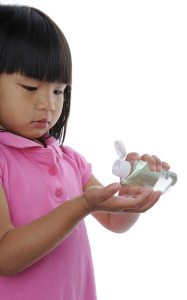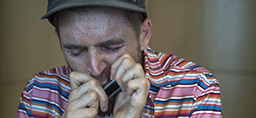
A growing number of children are ingesting hand sanitizer, either accidentally or on purpose, leading the American Association of Poison Control Centers to issue a warning to parents that ingesting the gel can lead to alcohol poisoning.
“We’re definitely seeing it,” Jackson Lanphear, MD, emergency medicine physician at Spectrum Health Helen DeVos Children’s Hospital, said of the behavior.
On average, Dr. Lanphear treats two to three patients a month, he said. While hospitals in California and other states have noticed a spike in the number of cases, Dr. Lanphear has not seen that trend locally.
Younger children are tempted by the colorful packaging and fruity scents of hand sanitizer, explained Todd Nickoles, RN, manager of pediatric trauma and injury prevention at Helen DeVos Children’s Hospital. Older children are ingesting it on purpose, often because they are trying to impress their friends or are looking for a buzz.
“You can get pretty sick if you ingest a significant amount,” said Bryan Judge, MD, a toxicologist and emergency medicine physician at Spectrum Health Butterworth and Helen DeVos Children’s Hospitals.
Most hand sanitizers contain at least 60 percent ethyl alcohol, a stronger concentration of alcohol than what is found in most hard liquors, according to poison control center experts.
“That means that even small amounts—just a couple of squirts—in very small children can cause alcohol poisoning,” Dr. Judge said.
Most of the pediatric cases have been accidental cases in which young children ingest a small amount or lick it off their hands. Because hand sanitizer tastes bad, the patients haven’t ingested a large amount, Dr. Lanphear added. After testing to be sure of the substance, clinicians generally monitor the child until the effects of the ethanol have worn off.
“Only when kids are trying to drink it do they ingest a whole lot of it,” he said.
Nickoles advises parents to recognize hand sanitizer as “a possible risk,” particularly as it pertains to older children, and closely monitor its use.
“In the past we have been told it’s a good idea to send kids to school with a little bottle of hand sanitizer,” he said. “Now that we realize the danger, maybe that’s a bad approach.”
Poison control centers across the country have managed more than 17,000 cases involving children younger than 12 ingesting hand sanitizer since 2011.
Of course, there are alcohol-free hand sanitizers on the market, but the Centers for Disease Control and Prevention recommends using a hand sanitizer that contains 60-95 percent alcohol because it is the most effective at killing germs.
So what should parents do if they’re afraid that their child may ingest the alcohol-based gel, either accidentally or on purpose?
“Plain old soap and water is a very underrated and low-tech solution,” said Daliya Khuon, MD, an infection prevention doctor at Helen DeVos Children’s Hospital. “Twenty seconds of scrubbing is effective hand hygiene, and it doesn’t even have to be antibacterial soap.”
 /a>
/a>
 /a>
/a>
 /a>
/a>